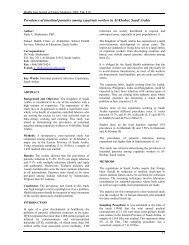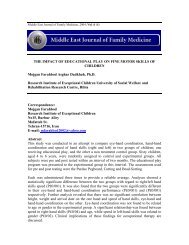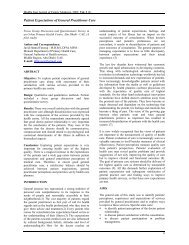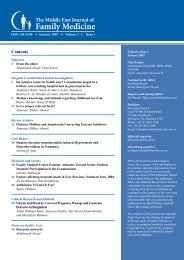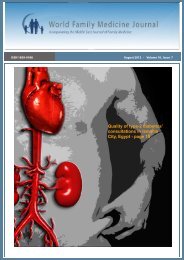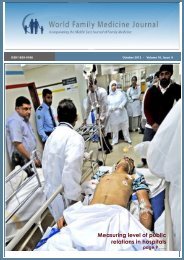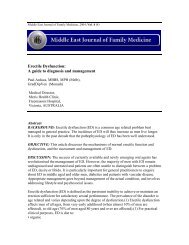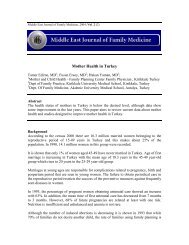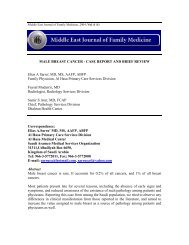full pdf of issue - Middle East Journal of Family Medicine
full pdf of issue - Middle East Journal of Family Medicine
full pdf of issue - Middle East Journal of Family Medicine
You also want an ePaper? Increase the reach of your titles
YUMPU automatically turns print PDFs into web optimized ePapers that Google loves.
ORIGINAL CONTRIBUTION AND CLINICAL INVESTIGATION<br />
There are social, cultural,<br />
religious and economical<br />
barriers that may impede access<br />
to healthcare. It warrants a need<br />
to address these barriers on a<br />
priority basis so that “Universal<br />
access” to “Person-Centered<br />
care” may be made available to<br />
the population <strong>of</strong> the region.<br />
Conclusion: A well planned and<br />
evidence based approach is the<br />
only way forward to ensure<br />
universal access to all<br />
populations in the <strong>East</strong>ern<br />
Mediterranean Region. Access<br />
to Person-Centered care is the<br />
need <strong>of</strong> the hour in the region.<br />
Provision <strong>of</strong> health care services<br />
through a well defined health<br />
system with a prime focus on<br />
a primary care model delivered<br />
by trained family doctors is the<br />
single most appropriate step to<br />
achieve health for all.<br />
Key words: Access: Primary<br />
Health Care, <strong>East</strong>ern<br />
Mediterranean Region,<br />
Person-Centered care, <strong>Family</strong><br />
Doctor<br />
Introduction<br />
Access to health and health care<br />
services is based on the need,<br />
provision and utilization <strong>of</strong> health<br />
services (1) and refers to the<br />
ability to access health care or the<br />
ease <strong>of</strong> obtaining health care(2).<br />
It involves the entry <strong>of</strong> a given<br />
individual or population group into<br />
the health care delivery system.<br />
Ensuring access is not restricted to<br />
providing appropriate health care<br />
resources but extends to include its<br />
distribution to the most deprived,<br />
with justice, irrespective <strong>of</strong> social<br />
class or standing. The concept <strong>of</strong><br />
access is multidimensional and<br />
includes availability, accessibility,<br />
accommodation, affordability, and<br />
acceptability as the key components<br />
(1).<br />
The <strong>East</strong>ern Mediterranean region<br />
(EMR) is the vast area stretching<br />
from Morocco in the west to Pakistan<br />
in the east. Health indicators vary<br />
across the region but many are a<br />
cause for concern, such as life<br />
expectancy <strong>of</strong> 50 years in Somalia<br />
compared to 81.5 years in Lebanon.<br />
Similarly, infant mortality rate is 134<br />
per 1000 live births in Afghanistan, in<br />
comparison to 7.0 in Qatar. Disparity<br />
in access to and utilization <strong>of</strong> health<br />
and social services coupled with<br />
uneven distribution <strong>of</strong> resources are<br />
considered the main reasons for poor<br />
health status in the region (3).<br />
A need was identified to look at the<br />
current status, barriers, opportunities,<br />
challenges and way forward with<br />
regards to “Person-Centered care” in<br />
the <strong>East</strong>ern Mediterranean region.<br />
Methods<br />
The Lead author from the “Working<br />
Party on Research <strong>of</strong> <strong>East</strong>ern<br />
Mediterranean Region” developed<br />
the idea and invited members<br />
through its “yahoo group” to<br />
participate in this networking<br />
project. Objectives and work plan<br />
were developed by the lead Author<br />
and shared with the interested<br />
contributors. Co-Authors and<br />
Advisors were invited to contribute<br />
and timelines were set for<br />
contributors to submit their report.<br />
Submissions were collected by Lead<br />
and Co-Authors and put into a draft<br />
that was shared with contributors<br />
for feedback. After incorporating<br />
feedback, the final draft was edited<br />
by the “Editor” before submission for<br />
publication consideration. Advisors,<br />
who were selected based on their<br />
experience with the subject, provided<br />
guidance. This paper is an evidence<br />
based systematic review <strong>of</strong> literature<br />
on access to health care and its<br />
utilization, <strong>issue</strong>s and challenges<br />
in EMR. Contributors, Authors and<br />
Editor referred to Medline and<br />
Pub Med search engines, World<br />
Health Organization (WHO) and<br />
National Health Survey reports.<br />
Recommendations are drawn relating<br />
to the health services utilization<br />
patterns observed in EMR countries.<br />
Health care status in EMR<br />
region<br />
Health care has undergone major<br />
transformations with an increased<br />
emphasis on ‘Person centred<br />
health care’, defined as health<br />
care that establishes a partnership<br />
among physicians, their patients’<br />
and families in an appropriate and<br />
holistic manner with a guarantee<br />
that the decisions made respect the<br />
wants, needs and preferences <strong>of</strong> the<br />
patients (4,5). It ensures that patients<br />
are treated as equal partners and<br />
receive appropriate and well-timed<br />
care in order to meet their needs as<br />
individuals, regardless <strong>of</strong> any health<br />
and social services boundaries(6).<br />
The shift from “Patient-Centred” to<br />
“Person-Centred” signifies a shift that<br />
looks at patients as healthy persons<br />
before they get sick and try to keep<br />
them in good health. The overall<br />
quality and equitable provision <strong>of</strong><br />
health care services depends upon<br />
the efficiency <strong>of</strong> its primary health<br />
care delivery and is considered the<br />
most appropriate way to provide<br />
health care in a cost effective manner<br />
(7). Over the past decades, EMR<br />
countries have realised the need<br />
to incorporate primary health care<br />
in health care delivery to improve<br />
access to health care (8). “<strong>Family</strong><br />
Practice” is recognized as a specialty<br />
and is considered to be a core<br />
component for success <strong>of</strong> any health<br />
system(9). <strong>Family</strong> Physicians are and<br />
should be considered the main force<br />
that delivers primary health care.<br />
The public sector plays a crucial part<br />
in delivering health care through<br />
strengthening health systems and<br />
generation <strong>of</strong> human, financial and<br />
other resources. Government is the<br />
main health provider in most <strong>of</strong> the<br />
EMR countries. The allocation <strong>of</strong><br />
budget for the health care sector in<br />
the majority <strong>of</strong> these countries is very<br />
low, not sufficient to fulfill the health<br />
needs <strong>of</strong> the country’s population<br />
(1). This is in contrast to oil and gas<br />
rich countries where the situation<br />
is slightly better and government<br />
is investing substantial finances to<br />
improve health care services for<br />
their people however it is still not<br />
sufficient to meet the health needs <strong>of</strong><br />
countries.<br />
Disease burden in the EMR<br />
The EMR suffers from double<br />
disease burden comprising<br />
communicable, and noncommunicable<br />
disease with<br />
increasing prevalence <strong>of</strong> mental<br />
disorders and accidents. Social and<br />
economical progress in EMR has<br />
MIDDLE EAST JOURNAL OF FAMILY MEDICINE VOLUME 10 ISSUE 6<br />
MIDDLE EAST JOURNAL OF FAMILY MEDICINE • VOLUME 7, ISSUE 10



